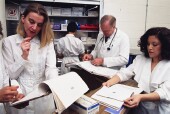Documentation is often insufficient, inaccessible, and not verbally reinforced
MONDAY, July 6, 2015 (HealthDay News) — Communication failures in the perioperative setting often result from inaccurate or inaccessible documentation, as well as document overload, according to a study published in the July issue of the Journal of Clinical Nursing.
Sandra Braaf, Ph.D., R.N., from the University of Melbourne in Australia, and colleagues analyzed data from 350 hours of observation, two focus groups, and 20 semi-structured interviews of 125 health care professionals (surgeons, anesthetists, and nurses). Analysis identified themes surrounding communication failures in the perioperative setting.
The researchers found that communication failure occurred due to a reliance on documents and documentation to transfer information at patient transition points. Poor quality of documents and documentation and problematic access to information also resulted in communication failures. Patient safety was affected by these failures, which led to delays in treatment and, at times, inadequate care.
“Organizational support needs to be provided to nurses, surgeons and anesthetists so they have sufficient time to complete, locate, and read documents and documentation,” the authors write. “Infrastructure supporting communication technologies should be implemented to enable the rapid retrieval, entry, and dispersion of information.”
Copyright © 2015 HealthDay. All rights reserved.








